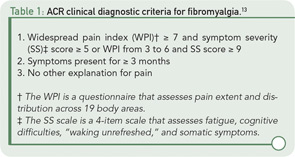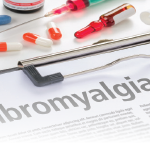Pain Management in RA
The treatment of pain in RA should be multifaceted. Although it is essential to control inflammation using immunomodulatory agents, it is also important to treat pain and promote functioning. To accomplish this goal, comprehensive management strategies should include nonpharmacologic methods, such as self-management programs that are commonly used to treat other chronic pain conditions such as fibromyalgia.14 In addition, clinicians also may consider pharmacologic treatments to address central pain processing deficits.
Self-management programs are geared toward educating patients about their conditions, teaching coping skills, improving functional status, and preventing relapses. The Arthritis Foundation Self-Help Program is a six-week group course that teaches methods to manage pain, fatigue, and stress. Several studies have shown short-term improvements in pain among patients who complete self-management programs.15
The data supporting the short- and long-term effectiveness of cognitive–behavioral therapy approaches are quite good. Patients with arthritis are taught skills, including activity pacing, goal setting, problem solving, relaxation, imagery, and cognitive restructuring to improve pain control.16 Web-based tools, like the Psychologist Locator on the website of the American Psychological Association (http://locator.apa.org), facilitate finding a practitioner in the community. In addition, efforts are ongoing to make these interventions more accessible through programs provided in the clinic by allied health professionals or accessible online directly by patients.
Solid evidence also exists for the integration of exercise into pain management programs for individuals with RA.17 Controlled trials in RA have evaluated aerobic training, strength training, and a combination of the two. Overall, these studies reported good outcomes, including decreased pain and improvements in physical functioning, muscle strength, aerobic capacity, disease activity, mood, and fatigue. As is the case with most interventions, patients with RA undertaking a new exercise regimen should be carefully evaluated beforehand, and the program tailored to the patient’s needs and abilities. Low-impact land- or pool-based exercise of low to moderate intensity engaged in two to three times a week is thought to be helpful for fibromyalgia pain and may generalize to persistent pain in RA.18 Local YMCAs often offer aqua aerobics classes, and organized mall-walking groups abound. Community chapters of the Arthritis Foundation can be helpful to locate appropriate regional exercise resources.
Pharmacologic therapies may include medications typically used to treat chronic widespread pain syndromes. The most data exist regarding the efficacy of tricyclic antidepressants in RA. Tricyclic antidepressants inhibit serotonin and norepinephrine reuptake, which may affect central pain processing through the inhibitory descending serotonin–norepinephrine pathways. Some small studies have reported reductions in pain among RA patients taking tricyclic antidepressants compared with those treated with placebo.19


